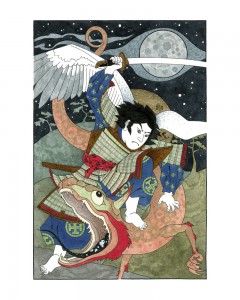
Samurai clad Archangel Michael opening a can of whoop-ass
on the Red Dragon of Revelation
by Daniel Mitsui
Here’s something that comes with this week’s Catholic Herald for Michaelmas, of which today is the Vigil.
In the Novus Ordo calendar the 26th Ordinary TobitSunday supplants the Feast of the Archangels Michael, Gabriel and Raphael. In the traditional calendar, these Archangels have their own feasts. This Sunday is the Feast of the Dedication of the Basilica of St. Michael, in Italy. Michaelmas.
Drawing on Scripture, theologians such as Pseudo-Dionysius and St Thomas Aquinas designate a triad of triads of angelic choirs according to their missions: Seraphim, Cherubim, and Thrones – Dominions, Virtues and Powers – Principalities, Archangels and Angels. Within these choirs there is hierarchy, no two angels being alike. As pure souls, “separated substances”, not individuated in matter, every angel is his own unique species, as unlike to each other as a giraffe is from a platypus.
As a “mere” Archangel, Michael belongs to one of the lower choirs. But such are God’s might and plan, that Michael is the one who restrained Satan, highest in the hierarchy and mightiest of all the angels before his fall. Michael it will be who chains the great “red dragon” of Revelation 12. That said, even the least of all the angels utterly transcends the material cosmos.
Angels, as the Lord says, always see the face of God (Matthew 18:10). Raphael says that he offered Tobit’s prayer “in the sight of God” (Tobit 12:12). Seeing the face of God, being “in his sight”, is both knowledge of and perfect submission to God’s will. So complete is their submission that it’s hard to tell in Scripture whether it’s an angel or God who speaks (cf Exodus 3:2-6). Perfect harmony.
That’s how angels, persons without limiting bodies, see things and then act. We, persons with bodies, limited by our physical senses and unable immediately to see the essence of things, must strive by reason with the help of authority and the grace of faith to discern and submit to God’s will.
Speaking of Michael, his name means, “Who is like God”? We are not like God. We are not like angels. We are like ourselves, in our humanity that the Son took into an unbreakable bond with His divinity. You can receive Communion and holy angels can’t. You can receive absolution for sins. Fallen angels can’t. You will experience the resurrection of the flesh. Marveling angels will rejoice. God gives missions to angels and to us. Angels might always succeed, but as the angelic Theresa of Calcutta said, “God doesn’t ask that we succeed in everything, but that we are faithful.”


































Consider this mere conjecture on my part, if you wish, but I see two possible reasons for why the relatively “lowly” St. Michael was able to drive the “mighty” Lucifer from Heaven – and neither involved a sword, a spear, or any other human type weapons wielded by a winged princely figure against an ugly anthropomorphic figure or any sort of dragon. That’s just artistic license for representing something completely immaterial.
The first is that St. Michael was wielding God’s Will, against which every created thing put together is next to nothing.
The second, and I think the more likely, is that Lucifer’s non serviam made his very being one of “no love”, hence intrinsically unable to be in God’s presence – in Heaven, in other words. In this case, St. Michael’s service to God might have been conveying to Lucifer the (Hellish) nature of his self-determined state.
My parish’s patron is St. Michael the Archangel, and for the first time that I can remember, we actually celebrated Michaelmas. I found it, as well as the homily, quite edifying.
Pingback: Michaelmas? Huh, What? | nebraskaenergyobserver